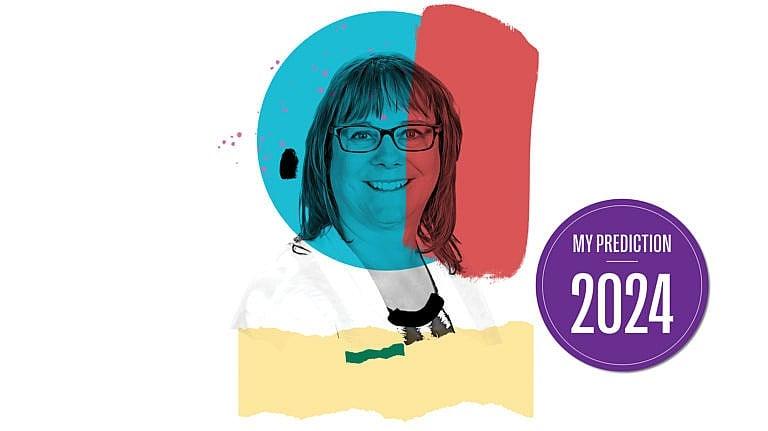Far-right politics will fuel extremism
Global conflicts are deepening political divisions at home, and Canadians need to fight back

(Illustration by Anna Minzhulina)
Share

Barbara Perry is the Director of the Centre on Hate, Bias and Extremism at Ontario Tech University
Right-wing extremism in Canada has been on an upward trajectory for the past few years. The reasons are complex: they include the rise of populist figures like Donald Trump; the backlash against public-health measures during the COVID-19 pandemic, which helped fuel the convoy movement; and the drive among far-right groups to recruit new converts online. At my university, we’ve identified 325 such groups in Canada that were active between 2016 and 2022, up from 100 only 10 years ago. We’ve also seen an increase in hate crimes in Canada, including 30 murders motivated by extreme-right ideologies, since 2016. In 2024, these movements will grow—and find new causes to exploit.
Many will gravitate to the fight against transgender rights. Last year, Saskatchewan and New Brunswick enacted laws requiring parental consent before teachers can use preferred pronouns for transgender or non-binary students under 16. In the fall, at the annual meeting of Alberta’s United Conservative Party, members passed a non-binding resolution to do the same. Legislation may follow, and protests have erupted nationwide to compel other jurisdictions to pursue similar policies.
Another major driver of extremism, on the left and the right, will be the ongoing war in Gaza. In the week following Hamas’s attack on Israel last October, the number of hate incidents reported to the National Council of Canadian Muslims increased by more than 1,000 per cent. As the conflict deepened with Israel’s assault on Gaza, police services nationwide reported increases in anti-Semitic and Islamophobic attacks, including a molotov cocktail thrown into a Montreal synagogue and shots fired at two Jewish schools in Toronto. As 2024 progresses, I believe public protests will become more explicitly hate-filled and divisive, and we may see a resurgence in far-right organizations surveilling and intimidating minority groups. This happened after 9/11, and in 2017 and 2018, when the far-right group Soldiers of Odin set up street patrols in Edmonton, Hamilton, Quebec City and elsewhere.
READ: During the Israel-Hamas war, three faith leaders are uniting their communities
Underpinning all of this will be the growth of online extremism, which has already birthed dangerous groups. The incel movement was strengthened by Gamergate, a campaign of harassment against women in video game culture. Quebec City mosque shooter Alexandre Bissonnette was famously radicalized online. In 2020, Canadian podcaster Jeremy MacKenzie—a member of the Plaid Army, a cohort of streamers associated with the convoy movement—founded the far-right group Diagolon.
Today, online extremists are more active than ever, especially on platforms that are hard for law enforcement to monitor, such as Telegram, an encrypted messaging service, and Gab, a microblogging site for tech enthusiasts that has been overtaken by ideologues. These became more popular after the 2021 Capitol insurrection in the U.S, when extremists were increasingly kicked off mainstream social media, only to strengthen their presence on alternative platforms.
Extremist voices, however, are now returning to Twitter, rebranded as X. Elon Musk slashed its content moderation teams and replatformed many of those kicked off three years ago. Chat rooms associated with online games have also been infested with far-right recruiters, who draw impressionable users deeper into extremism through conversation. Then there are games with overtly racist themes, like Ethnic Cleansing, in which players earn points for killing Jews and people of colour.
If Donald Trump wins the Republican nomination this summer, we can expect these divisions to deepen. His anti-immigrant, xenophobic talking points already found a willing Canadian audience after 2016, and he’s certain to revert to them—he’s already pledged to reinstate his ban on travellers from Muslim-majority countries. It’s extremely important that Canadian conservatives distinguish themselves from this divisive populist rhetoric. Yet Pierre Poilievre, our federal Conservative leader, marched alongside convoy protesters in Ottawa, and has since failed to put much distance between that movement and himself, toying with the line between politician and ideologue.
There are efforts afoot to neutralize extremism. Nationally and locally, civil-society groups like the Friends of Simon Wiesenthal, the National Council of Canadian Muslims, PFLAG Canada and many others are developing plans to push back. But it will take ordinary Canadians to truly stamp out extremism. The challenge for 2024, as wars rage and populism destabilizes our politics, will be to normalize making peace with those who disagree with us, to foster discussion and education among young people in schools and to prevent more people from falling into these dark spaces.

This article is part of the Year Ahead 2024, which is Maclean’s annual look at everything that’s coming your way next year. You can buy the print version right here.